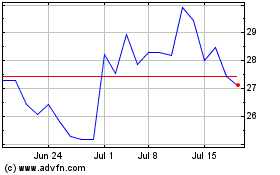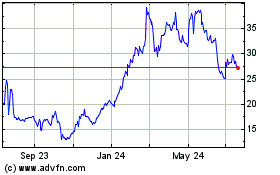Tarsus Initiates Phase 2a Ersa Trial Evaluating TP-03 for the Treatment of Meibomian Gland Disease
August 05 2022 - 8:30AM

Tarsus Pharmaceuticals, Inc. (NASDAQ: TARS), whose mission is to
focus on unmet needs and apply proven science and new technology to
revolutionize treatment for patients, starting with eye care, today
announced that it has enrolled the first patient in a Phase 2a
clinical trial studying TP-03 (lotilaner ophthalmic solution,
0.25%) for the treatment of Meibomian Gland Disease (MGD) in
patients with Demodex mites. Demodex mites live in the meibomian
glands and have been associated with microstructural glandular
changes that can result in inflammation. Currently, there are no
U.S. Food and Drug Administration (FDA) approved pharmacologic
treatments for MGD. TP-03 has been evaluated in two pivotal trials
collectively involving more than 800 patients with Demodex
blepharitis where it met the primary endpoint and all secondary
endpoints and was well-tolerated. Tarsus plans to submit a New Drug
Application (NDA) to the FDA for TP-03 for the treatment of Demodex
blepharitis in the second half of 2022.
“We’re enthusiastic about expanding our therapeutic footprint in
eye care, as we evaluate TP-03 in another highly prevalent eyelid
margin disease that has no FDA approved pharmacologic therapies,”
said José Trevejo, M.D., Ph.D., Chief Medical Officer of Tarsus.
“We look forward to leveraging key learnings from our Saturn-1 and
2 trials where TP-03 demonstrated statistically significant
efficacy in treating Demodex blepharitis with a favorable safety
profile. We are eager to explore its potential to treat another
important eye disease associated with the presence of Demodex
mites.”
The meibomian glands line the eyelid margin and are responsible
for secreting lipids that make up the superficial lipid layer of
the tear film and prevent tears from evaporating. MGD occurs when
the glands are not producing enough lipids, or the lipids they
secrete are of poor quality. MGD is highly prevalent and thought to
be the leading cause of Dry Eye Disease, impacting approximately
2/3 of the 34 million patients with Dry Eye Disease in the U.S.
Patients with MGD experience symptoms of eye irritation and
inflammation and when left untreated, may experience permanent
changes to the tear film and progressive gland loss.
About TP-03TP-03 (lotilaner ophthalmic
solution, 0.25%) is a novel, investigational therapeutic designed
to resolve the signs of Demodex blepharitis by targeting and
eradicating the root cause of the disease – Demodex mite
infestation. Lotilaner is a well-characterized anti-parasitic agent
that paralyzes and eradicates Demodex mites by selectively
inhibiting the GABA-Cl channels. It is a highly lipophilic
molecule, which may promote its uptake in the oily sebum of the eye
lash follicles where the mites reside. TP-03 was evaluated in two
pivotal trials collectively involving more than 800 patients. Both
trials met the primary endpoint and all secondary endpoints, with
statistical significance and no serious treatment-related adverse
events. Both trials also demonstrated that TP-03 was generally safe
and well-tolerated. If approved, TP-03 may offer treatment for
millions of patients with Demodex blepharitis. TP-03 is now also
being studied for the treatment of MGD in patients with Demodex
mites.
About Demodex
BlepharitisBlepharitis is a common lid margin
disease that is characterized by eyelid margin inflammation,
redness and ocular irritation. Demodex blepharitis is caused by an
infestation of Demodex mites, the most common ectoparasite found on
humans and accounts for over two-thirds of all blepharitis cases.
Demodex blepharitis may affect as many as 25 million Americans
based on an extrapolation from the Titan study indicating 58% of
patients presenting to U.S. eye care clinics have collarettes, a
pathognomonic sign of Demodex infestation, and that at least 45
million people annually visit an eye care clinic. Demodex
blepharitis can have a significant clinical burden and negative
impact on patients’ daily lives. The Titan study also showed that
current management tools, such as tea tree oil and lid wipes, are
ineffective at treating Demodex blepharitis. Currently, there are
no FDA-approved treatments for Demodex blepharitis.
About Tarsus Pharmaceuticals, Inc.Tarsus
Pharmaceuticals, Inc. applies proven science and new technology to
revolutionize treatment for patients, starting with eye care.
Tarsus is advancing its pipeline to address several diseases with
high unmet need across a range of therapeutic categories, including
eye care, dermatology, and infectious disease prevention. Tarsus is
studying two investigational medicines in clinical trials. Its lead
product candidate, TP-03, is a novel therapeutic which has
demonstrated positive results in two pivotal trials for the
treatment of Demodex blepharitis. TP-03 is also being developed for
the treatment of Meibomian Gland Disease. In addition, Tarsus is
developing TP-05, an oral, non-vaccine therapeutic for the
prevention of Lyme disease, which is currently being studied in a
Phase 1b clinical trial.
Forward-Looking StatementsStatements in this
press release about future expectations, plans and prospects, as
well as any other statements regarding matters that are not
historical facts, may constitute “forward-looking statements.”
These statements include statements regarding the potential market
size for TP-03, future events and Tarsus’ plans for and the
anticipated benefits of its product candidates including TP-03, the
timing, objectives and results of the clinical trials including the
potential complete clinical results of the Saturn-2 trial,
anticipated regulatory and development milestones, and the
quotations of Tarsus’ management. The words, without limitation,
“believe,” “contemplate,” “continue,” “could,” “estimate,”
“expect,” “intend,” “may,” “might,” “plan,” “potential,” “predict,”
“project,” “should,” “target,” “will,” or “would,” or the negative
of these terms or other similar expressions are intended to
identify forward-looking statements, although not all
forward-looking statements contain these or similar identifying
words. Actual results may differ materially from those indicated by
such forward-looking statements as a result of various important
factors. Further, there are other risks and uncertainties that
could cause actual results to differ from those set forth in the
forward-looking statement and they are detailed from time to time
in the reports Tarsus files with the Securities and Exchange
Commission, including Tarsus’ Form 10-K for the year ended December
31, 2021 filed on March 14, 2022 with the SEC, which Tarsus
incorporates by reference into this press release, copies of which
are posted on its website and are available from Tarsus without
charge. However, new risk factors and uncertainties may emerge from
time to time, and it is not possible to predict all risk factors
and uncertainties. Accordingly, readers are cautioned not to place
undue reliance on these forward-looking statements. Any
forward-looking statements contained in this press release are
based on the current expectations of Tarsus’ management team and
speak only as of the date hereof, and Tarsus specifically disclaims
any obligation to update any forward-looking statement, whether as
a result of new information, future events or otherwise.
Contacts: Media Contact:Adrienne KempSr.
Director, Corporate Communications(949)
922-0801akemp@tarsusrx.com
Investor Contact:David NakasoneHead of Investor Relations(949)
620-3223DNakasone@tarsusrx.com
###
Tarsus Pharmaceuticals (NASDAQ:TARS)
Historical Stock Chart
From Mar 2024 to Apr 2024

Tarsus Pharmaceuticals (NASDAQ:TARS)
Historical Stock Chart
From Apr 2023 to Apr 2024
